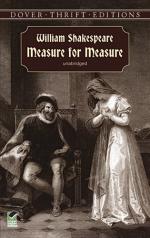|
This section contains 15,650 words (approx. 53 pages at 300 words per page) |

|
SOURCE: Cohen, Stephen. “From Mistress to Master: Political Transition and Formal Conflict in Measure for Measure.” Criticism 41, no. 4 (fall 1999): 431-64.
In the following essay, Cohen contends that Measure for Measure begins as a romantic comedy and ends as a monarch play. The critic maintains that these two incompatible genres result in the play's “notorious contradictions, incongruities, and frustrated expectations.”
Through most of its critical history, responses to Measure for Measure have been of two types: those proffering a key that unlocks the play's notorious difficulties to reveal its unity and integrity, and those that find the play's unsatisfactory elements irreconcilable and thus declare it a failed or flawed work.1 In the last twenty-five years, however, readings that dismiss the play as flawed have largely been supplanted by others that see in those same flaws a different sort of key to the play: troubling aspects of characterization, plotting, and...
|
This section contains 15,650 words (approx. 53 pages at 300 words per page) |

|


